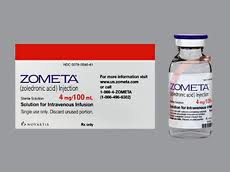
Zometa 4 mg (zoledronic acid for injection) has been approved for the treatment of hypercalcemia of malignancy (HCM), a common life-threatening metabolic complication associated with cancer. Zometa is an intravenous bisphosphonate that works by inhibiting the breakdown of bone (resorption).
HCM affects more than 10% of all cancer patients and occurs most frequently with breast cancer, multiple myeloma and non-small cell lung cancer. This condition occurs when factors made by cancer cells over-stimulate osteoclasts, which are cells responsible for bone resorption. The over-stimulation results in an increased rate of bone breakdown and the release of excess calcium into the bloodstream. The kidneys are unable to cope with the excessively high calcium levels and the calcium remains in the blood, leading to complications such as dehydration, fatigue, nausea, vomiting, confusion and coma.
In general, adverse reactions to Zometa were mild and short-lived. Adverse events reported by subjects in clinical trials include (but are not limited to) the following:
• Fever
• Nausea
• Constipation
• Diarrhea
• Vomiting
• Abdominal pain
• Anemia
